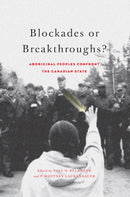Description
Blockades or Breakthroughs? Aboriginal Peoples Confront the Canadian State, debates the importance and effectiveness of blockades and occupations as political and diplomatic tools for Aboriginal people. The adoption of direct action tactics like blockades and occupations is predicated on the idea that something drastic is needed for First Nations to break an unfavourable status quo, overcome structural barriers, and achieve their goals. But are blockades actually breakthroughs? What are the objectives of First Nation communities who adopt this approach? How can the success of these methods be measured? This collection offers an in-depth survey of occupations, blockades, and their legacies, from 1968 to the present. Individual case studies (Caldwell First Nation and Point Pelee; Lyell Island and the Haida; Lubicon Lake; Innu and Inuit and low-level military flying in Labrador; Oka; Oldman River Dam; Ipperwash; Gustafsen Lake; Burnt Church; Tyendinaga; and Six Nations of the Grand River and Calendonia) situate specific blockades and conflicts in historical context, examine each group's reasons for occupation, and analyze the media labels and frames applied to both First Nations and state responses. Direct action tactics remain a powerful political tool for First Nations. The authors of Blockades or Breakthroughs? argue that blockades and occupations are instrumental, symbolic, and complex events that demand equally multifaceted responses. Three chapters examine Mohawk and Six Nations Iroquois communities in this collection. In A Bridge to Far: The Oka Crisis by military historian P. Whitney Lackenbaur; Yale Belanger's essay about the Tyendinaga Mohawks, Blockades, Occupations, and the Bay of Quinte Mohawks' Fight for Sovereignty; and Timothy Winegard's piece Your Home on Native Land: Conflict and Controversy at Caledonia and the Six Nations of the Grand River each provides a scholar's perspective to the land rights concerns at the community level. Most take the works of other scholars and local and national media's perspectives as sources. Dr. Yale Belanger is an associate professor, Political Science, and adjunct associate professor, Faculty of Health Sciences, University of Lethbridge.


